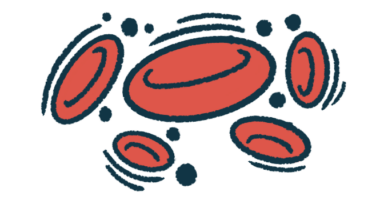Oral therapy Voydeya OK’d in EU as add-on to Soliris or Ultomiris
The treatment is also approved for PNH in Japan and, recently, the US

The oral therapy Voydeya (danicopan) is now approved in the European Union as an add-on treatment for paroxysmal nocturnal hemoglobinuria (PNH).
The European Commission authorized the therapy for adults with PNH who have residual hemolytic anemia — that is, low counts of red blood cells because those cells are being destroyed in a process also known as hemolysis. Voydeya is given as an add-on to the standard-of-care therapies Ultomiris (ravulizumab) and Soliris (eculizumab). All three medications are sold by Alexion, AstraZeneca Rare Disease.
In PNH, part of the immune system called the complement cascade becomes abnormally activated to destroy red blood cells. Ultomiris and Soliris both work to block complement activation by targeting a complement protein called C5.
These medications are generally effective for controlling intravascular hemolysis, or red blood cell destruction occurring inside blood vessels. But according to Alexion, as many as one in five PNH patients treated with Soliris or Ultomiris will continue to experience substantial anemia because of extravascular hemolysis (EVH), which occurs when red blood cells are destroyed outside blood vessels.
Voydeya targets another complement protein called factor D, which acts upstream or before C5 in the cascade of complement activation. By blocking this protein, the therapy can reduce EVH without interfering with the activity of Soliris or Ultomiris.
Support for the approval
“For patients with PNH, Voydeya as an add-on therapy has been shown to address signs and symptoms of clinically significant EVH, including anaemia, while maintaining standard-of-care treatment with Soliris or Ultomiris,” Marc Dunoyer, CEO of Alexion, said in a company press release.
Hubert Schrezenmeier, MD, medical director of the Institute of Transfusion Medicine at the University of Ulm in Germany, said the approval of Voydeya in the EU “represents an important innovation for the subset of patients with PNH who experience continued symptoms of anaemia due to EVH while treated with a C5 inhibitor.”
“These patients now have an option to address the manifestations of EVH while remaining on treatment with standard-of-care C5 inhibitor therapy, Soliris or Ultomiris, to maintain disease control and help prevent the potentially life-threatening complications that can be associated with this devastating disease,” Schrezenmeier said.
Voydeya’s approval in the EU came just a few weeks after the therapy was approved in the U.S., where it will be supplied through the pharmacy Onco360. Voydeya was also approved in Japan in January. Regulatory reviews in other countries are ongoing, according to Alexion.
“We look forward to making this first-in-class Factor D inhibitor available to patients in Europe and to advancing access around the globe,” Dunover said.
The Committee for Medicinal Products for Human Use (CHMP), a branch of the European Medicines Agency (EMA), recommended Voyeya for approval based on data from the Phase 3 ALPHA clinical trial (NCT04469465). The study enrolled 86 adults with PNH who had clinically significant EVH despite being on Soliris or Ultomiris. Participants were randomly assigned to take Voydeya or a placebo for about three months, given on top of Soliris or Ultomiris.
Results showed that Voydeya outperformed placebo at relieving anemia, easing fatigue, and reducing the need for blood transfusions. Recent data from the study also showed the benefits of Voydeya were consistent for as long as one year.
Since Voydeya works by suppressing a part of the immune system, it can increase the risk of certain infections, including serious ones caused by encapsulated bacteria. The most commonly reported side effects observed during ALPHA in patients receiving Voydeya included headache, nausea, joint pain, and diarrhea.








